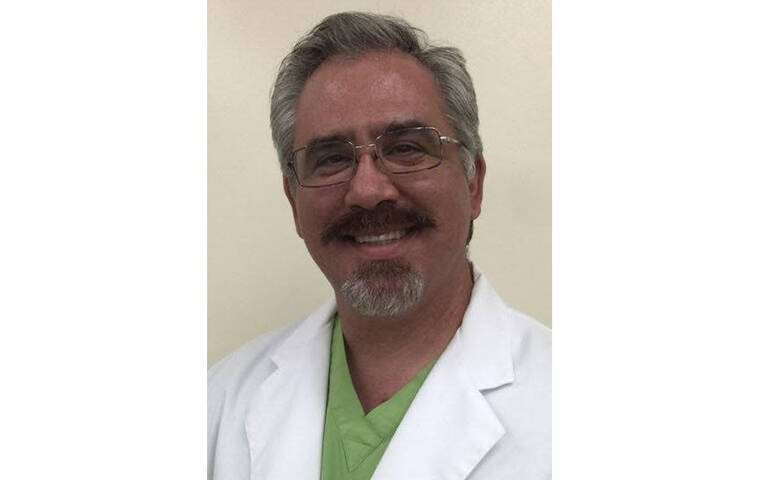University’s Willed Body Program pausing donations

UH MANOA /JABSOM
Steven Labrash:
He is director of the Willed Body Program at the University of Hawaii at Manoa John A. Burns School of Medicine
A too-full morgue has led the University of Hawaii’s John A. Burns School of Medicine to reluctantly announce it cannot take any more body donations to its Willed Body Program until probably 2024.
The COVID-19 pandemic has caused a plunge in the number of doctors seeking surgical training on cadavers at the Kakaako medical school. A news release issued Wednesday said body donations would no longer be accepted as of the close of business July 10, until further notice.
Program Director Steven Labrash said he felt it would be inappropriate to give details about the bodies waiting longer than usual in the JABSOM morgue to be used for medical education and research. But he said the morgue in the past normally has been about half full, and “right now our space is about 95-plus percent utilized.”
He thinks it may be December or January before body donations can be accepted again, but can’t be sure.
“We wholeheartedly apologize for any inconvenience that this may cause. We urge donors and/or their loved ones to look for alternative arrangements at this time,” the news release said.
Labrash said he feels for the handful of families upset that their relative’s stored body had yet to be used in the Willed Body Program. “But I think most of the families, probably 99% of them, are understanding. They’re going through the same pandemic that everybody’s gone through, and they understand the issues. Some of them take a little bit more explaining … and I think once they understand, I think they’re all good with it.”
Don't miss out on what's happening!
Stay in touch with breaking news, as it happens, conveniently in your email inbox. It's FREE!
Willed bodies, voluntarily donated to advance science and education, are reverently referred to in the field as “silent teachers.” They are crucial in the training of physicians and other health- related professionals, and UH has maintained a body donation program for 18 years.
While the use of donated bodies to teach anatomy to students in medicine and other health-related fields is fairly well known, Labrash said, another important use for willed bodies is continuing medical education for licensed surgeons.
“A lot of people aren’t aware that when doctors become doctors, their educational requirements are not over,” he said. “As long as they want to have a valid license, they have what’s called continuing medical education, which is a certain number of hours that they need to learn new techniques, new procedures, work with new equipment. Medicine is constantly evolving.”
Hawaii is a major hub for such continuing education, particularly for doctors from the Asia-Pacific region where training on cadavers is either disallowed by religion or culture, or simply unavailable, Labrash said.
Before the pandemic JABSOM typically attracted around 1,000 doctors a year from across Asia and the Pacific seeking such continuing medical education. But then the pandemic all but shut down travel from Asia, which brought the flow of surgical trainees to a near halt, and it hasn’t yet recovered, he said.
Roughly 3,000 Hawaii residents are currently registered to donate their bodies after death. For those who die during the closure of the Willed Body Program, their families are asked to notify the program so the database can be updated. A few have disenrolled, Labrash said.
New applicants have not been accepted for the past six months, he said. If additional residents submit applications during the program’s closure, the applications will be acknowledged, but none will be enrolled for now.
Labrash said he hopes the program’s pause will not deter people from donating their bodies for science and education, and if UH is not able to take them, he encourages consideration of other medical schools.
“A lot of things in medicine have changed in the last 100 years, but the one thing that is constant is learning the human body,” he said. “It’s imperative that doctors learn everything they can about the human body and how it functions, if they’re going to essentially be the mechanics for human bodies for us.”
Each willed body “contributes directly to new understandings,” says the program’s website. “The need is great, and each gift is valued and honored. Students and staff treat each donor with the utmost respect and dignity.”
The program also covers cremation of the willed bodies, and each year medical students and staff hold a memorial service in appreciation of the donors and their families. More information is available at jabsom.hawaii.edu/donors/willedbody. Opens in a new tab




